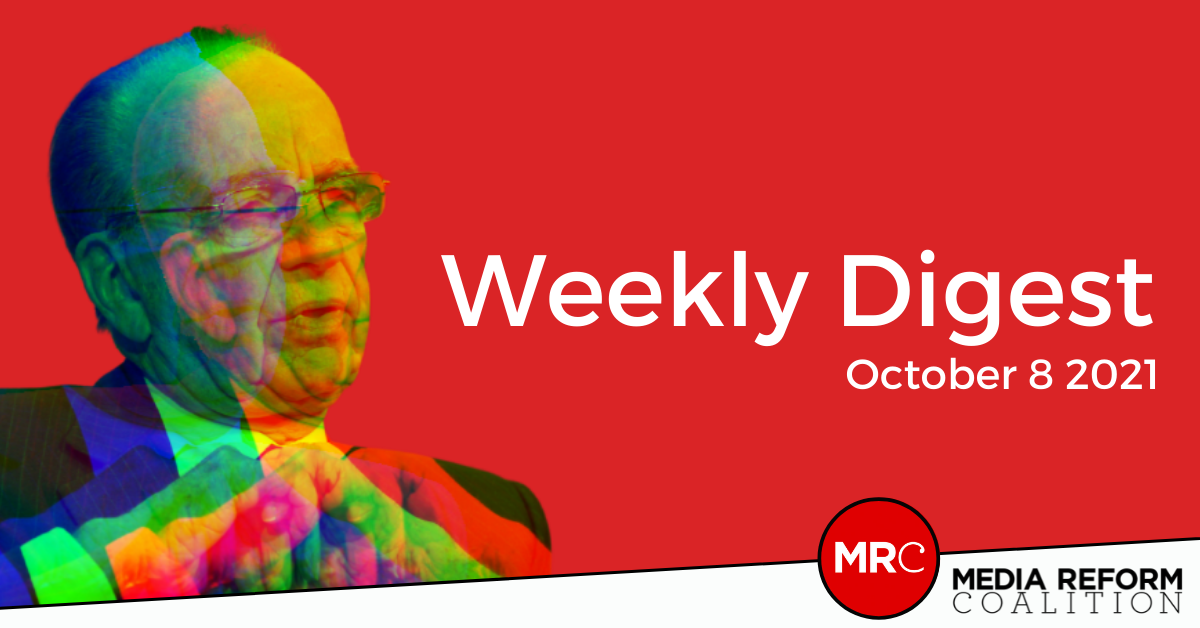Hi everyone, Eliz Mizon here with the Media Reform Coalition blog every Friday.
For even more media news and analysis, the latest media reform campaigns, and intriguing content from around the web, follow me at Chompsky: Power and Pop Culture.
For now, here’s your media news digest.
The BBC and Beyond campaign is back…
We spent the summer writing our Manifesto for a People’s Media, which will be launched publicly in the next few weeks. The manifesto calls for the creation of a media commons. This outlines a ‘People’s BBC and Channel 4’ (transformed to become far more devolved and participatory), alongside an Independent Media Commons – a thriving ecology of participatory newsrooms, community radio stations, digital innovators and cultural producers, supported by significant public resources to tell the stories of all the UK’s communities.
We hope you came to our first workshop yesterday – don’t miss the next one:
-
Tuesday, October 12th 1-2 PM: workshop on the digital and data aspects of the manifesto, aimed at people who’ve been thinking about the digital commons, and those involved in Open Source, non-profit and community-oriented tech initiatives
It would be great to see you there.
Don’t Forget to Read Our New Report: Funding Journalism
Researcher Leo Watkins has released his report, supported by the Media Reform Coalition and the Central European University, on the financial, engagement, and power dynamics of the UK’s media industry.
It’s not simply raw data and dry facts, although it contains plenty of useful information for anyone looking for stats; it also tells the story of the changing face of UK media over the last few decades.
Read the report.Hacked Off’s IPSO Campaign
Hacked Off’s new campaign is asking: How long has IPSO existed without launching a standards investigation? “Over the last seven years, there have been countless cases of discrimination, inaccuracy and abuse in the press. Yet, nearly 7 years after it was set up, IPSO has not launched a single standards investigation, nor issued a single fine.” Please share!This Week’s Media News
- This morning, joint winners of 2021’s Nobel Peace Prize were announced: Maria Ressa and Dmitry Muratov, two journalists who have led the global fight for press freedom this year. As seen in last week’s newsletter, Ressa has just recently launched The International Fund for Public Interest Media alongside former BBC/NYT executive Mark Thompson. (BBC)
- The biggest ever leak of offshore financial data, The ‘Pandora Papers’, this week shone ever more light on the mechanisms by which the world’s wealthy use financial structuring to avoid tax. A more in-depth look from WIRED magazine can be found below in Campaigns + Content. (The Guardian)
- The UK’s terrestrial broadcasters (BBC, ITV, C4 and C5) are joining forces to launch their own streaming platform, in an ongoing “battle” with streaming giants. (Bloomberg)
- The Ozy saga continues. The company has been sued by one of its investors and announced at the end of last week that it had shut down – something chief Carlos Watson later retracted. Allegations of abuse and discrimination at the company have surfaced also. (NYT/Look What You Made Me Do)
- The BBC has reached a settlement with Matt Weissler, the graphic designer whose contract was ended when he blew the whistle on Martin Bashir. Bashir had asked Weissler to mock up the now-infamous bank statement as a prop for a programme, without telling him what he would use it for. Weissler subsequently told superiors. (BBC)
- Ofcom’s new guidelines have stated that video platforms with headquarters in the UK, such as TikTok, Snap and OnlyFans, must increase protections for under-18’s and improve the mitigation of harmful and illegal content including hate speech and terrorism, or face fines. (FT)
- Google and YouTube have revealed they will block monetised advertising on content that denies climate change. (Axios)
- YouTube has chosen to delete R. Kelly’s official channels from its platform after his sexual abuse conviction but to keep his back catalogue on YouTube Music. (Reuters)
- Private equity firm Blackstone Inc. is in discussion with producer Nile Rogers and music manager Merck Mercuriadis to invest $1 billion in their company Hipgnosis Songs Fund, which claims it is seeking to buy up hundreds of thousands of popular songs with a view to changing the industry in favour of artists. (Bloomberg/Thought Economics)
- A Freedom of Information request by Press Gazette has revealed the BBC has formally disciplined four of its journalists this year under new social media guidelines introduced by new director-general Tim Davie. They include a ban on “virtue signalling” and criticism of colleagues, and the note that ‘emojis can “undercut an otherwise impartial post”’ and ‘liking or following certain accounts can be enough to count as sharing a personal opinion on an issue.’ (Press Gazette)
- The Institute for Nonprofit News has found that the number of single-topic nonprofit news organizations quadrupled since 2008. This is the fastest-growing news niche among their five identified categories: “nonprofit newsrooms focused on national and global news (which continue to attract most of the foundation and major donor revenue); state and regional news; local news; communities of color; and single-subject journalism.” (NiemanLab)
- UK culture secretary Nadine Dorries told the Tory party conference that the BBC is a company “staffed by people whose Mum and Dad worked there”. Dorries has previously been criticised for employing two of her children in her parliamentary office. (The Guardian)



